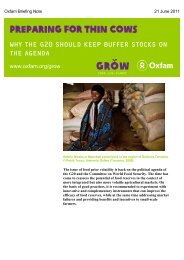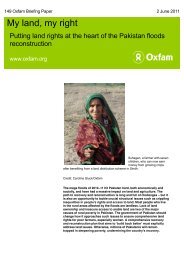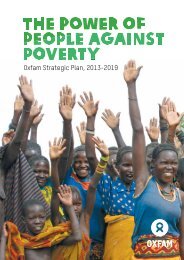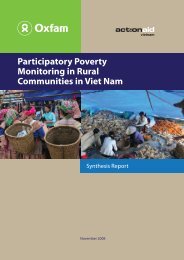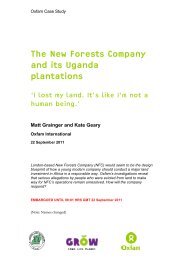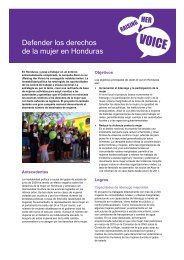Challenges to Rural Poverty Reduction in Viet Nam - Oxfam Blogs
Challenges to Rural Poverty Reduction in Viet Nam - Oxfam Blogs
Challenges to Rural Poverty Reduction in Viet Nam - Oxfam Blogs
Create successful ePaper yourself
Turn your PDF publications into a flip-book with our unique Google optimized e-Paper software.
Participa<strong>to</strong>ry poverty moni<strong>to</strong>r<strong>in</strong>g <strong>in</strong> rural communities <strong>in</strong> <strong>Viet</strong> <strong>Nam</strong><br />
100<br />
Gender impacts of local casual jobs<br />
Incomes are normally <strong>to</strong>o low for people <strong>to</strong> save. Although the average wage for<br />
both men and women has <strong>in</strong>creased over the past five years (from 20,000 - 30,000<br />
VND/day <strong>in</strong> 2007 <strong>to</strong> 100,000 VND/day <strong>in</strong> 2011) as work is <strong>in</strong>frequent and unstable<br />
<strong>in</strong>comes often only cover daily expenditures and little is left for sav<strong>in</strong>gs. An exception is<br />
Thanh Xuong - Dien Bien and Thuan Hoa - Tra V<strong>in</strong>h where many people work as porters<br />
all year round, and <strong>in</strong>comes are higher than other areas.<br />
Men tend <strong>to</strong> earn higher wages, but contribute less <strong>to</strong> the household. Heavy<br />
labour commands a higher daily wage for men. However, as men often spend part of<br />
their wages on cigarettes, coffee, and dr<strong>in</strong>k<strong>in</strong>g with friends they tend <strong>to</strong> contribute less<br />
<strong>to</strong> the household than women.<br />
Local casual jobs often re<strong>in</strong>force traditional gender roles. Basically, local casual<br />
jobs often follow the model “men do heavy work, social work, while women do lighter<br />
works, work <strong>in</strong> the family”. When men do local casual jobs, women stay at home <strong>to</strong> take<br />
care of housework, children, and animal husbandry. “Husbands don’t do anyth<strong>in</strong>g after<br />
go<strong>in</strong>g back home from work, we have <strong>to</strong> cook for them.” (Women group of Ma Du village,<br />
Phuoc Thanh - N<strong>in</strong>h Thuan). In the case of women do<strong>in</strong>g casual jobs, they still have <strong>to</strong> do<br />
all housework before go<strong>in</strong>g <strong>to</strong> work or after go<strong>in</strong>g back home from work.<br />
Risks of local casual jobs<br />
Local casual jobs tend <strong>to</strong> be safe, but there are risks. These <strong>in</strong>clude exposure<br />
<strong>to</strong> “social evils” (work<strong>in</strong>g as a porter <strong>in</strong> Thanh Xuong - Dien Bien), receiv<strong>in</strong>g lower than<br />
agreed wages, (construction work <strong>in</strong> Ban Lien - Lao Cai), and accidents (timber transport<br />
<strong>in</strong> Xy - Quang Tri) (Box 5.4).<br />
BOX 5.4. Risks of local casual jobs<br />
Ban Lien commune (Bac Ha - Lao Cai) received <strong>in</strong>vestments for various<br />
<strong>in</strong>frastructures <strong>in</strong> 2008, so many people of the Tay ethnic group went <strong>to</strong> work for<br />
such constructions. However, many of them were taken off their wages. In Doi 1<br />
village, 7 men and 20 women work as masons at construction sites <strong>in</strong> the commune<br />
be<strong>in</strong>g ripped off their wage, of up <strong>to</strong> 3 months/person, at 40,000 - 50,000 VND/<br />
day. The reason was that the construc<strong>to</strong>r left the construction due <strong>to</strong> high price and<br />
losses, leav<strong>in</strong>g beh<strong>in</strong>d mach<strong>in</strong>ery and construction materials. Because of this, many<br />
households were <strong>in</strong> debt of up <strong>to</strong> hundreds of thousands of VND <strong>to</strong> local sellers<br />
(debt rarely happened before, but now s<strong>in</strong>ce there are additional <strong>in</strong>comes, people<br />
borrow more with the hope that the additional <strong>in</strong>come can compensate the debt).<br />
Local sellers also suffered as some construc<strong>to</strong>rs didn’t pay their debt.<br />
In Xy commune (Huong Hoa, Quang Tri), a job that br<strong>in</strong>gs a significant <strong>in</strong>come<br />
<strong>to</strong> households is timber transport <strong>in</strong> Laos, but this job is very heavy and risky. Van<br />
Kieu ethnic m<strong>in</strong>ority men often have <strong>to</strong> carry 50 - 60 kilos <strong>in</strong> the forest for 3-4 days<br />
consecutively. They often face risk of accidents dur<strong>in</strong>g ra<strong>in</strong>s, (sometimes with broken<br />
limbs, or pa<strong>in</strong>), be<strong>in</strong>g bitten by <strong>in</strong>sects, or high fever. Some people were arrested and<br />
so had <strong>to</strong> pay a f<strong>in</strong>e <strong>to</strong> get back home.<br />
5.3. Labour export<br />
Few people from the moni<strong>to</strong>r<strong>in</strong>g po<strong>in</strong>ts have jo<strong>in</strong>ed labour export programmes.<br />
In 2011, there were labour export programmes run by the district Labour - Invalids and



